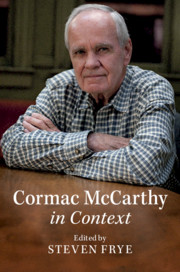Book contents
- Cormac McCarthy in Context
- Cormac McCarthy in Context
- Copyright page
- Contents
- Contributors
- Acknowledgments
- Chronology
- Part I Environments
- Part II Literary Contexts: Sources, Influences, Allusions
- Part III Intellectual Contexts
- Part IV Social and Cultural Contexts
- Chapter 18 North American Politics
- Chapter 19 Race and Cultural Difference
- Chapter 20 Ecology
- Chapter 21 Modernity
- Chapter 22 A Visual Artist and McCarthy
- Chapter 23 Cinematic Adaptations
- Chapter 24 Cinematic Influences
- Part V Archives, Critical History, Translation
- Works Cited
- Index
Chapter 21 - Modernity
from Part IV - Social and Cultural Contexts
Published online by Cambridge University Press: 12 December 2019
- Cormac McCarthy in Context
- Cormac McCarthy in Context
- Copyright page
- Contents
- Contributors
- Acknowledgments
- Chronology
- Part I Environments
- Part II Literary Contexts: Sources, Influences, Allusions
- Part III Intellectual Contexts
- Part IV Social and Cultural Contexts
- Chapter 18 North American Politics
- Chapter 19 Race and Cultural Difference
- Chapter 20 Ecology
- Chapter 21 Modernity
- Chapter 22 A Visual Artist and McCarthy
- Chapter 23 Cinematic Adaptations
- Chapter 24 Cinematic Influences
- Part V Archives, Critical History, Translation
- Works Cited
- Index
Summary
A critique of modernity and the European Enlightenment is persistent in Cormac McCarthy’s work. In the Appalachian novels, the ancient and the pre-industrial are yet to be swamped by the hegemony of modernity, though its depredations are clearly visible. A shift arrives with Judge Holden in Blood Meridian. Informed by his anthropocentric notion of “suzerainty,” Holden embodies the notion that violence and progress are inseparable. The development of modernity is dependent on this rational, instrumental, and necessary relationship. The Enlightenment has liberated man from the spiritual and physical constraints of previous arrangements. This strain of thinking reaches its apotheosis in the wasteland of The Road in which modernity and its technologies have facilitated planetary apocalypse. There is, however, resistance. The behavior and consciousness of animals, and landscape and the non-animate world, are imbued with it, and there is an elusive spirituality connected to these phenomena that defies modernity’s disenchantment of the world. We are dared by McCarthy to call from the depths of our imagination a different kind of world, in which humanity recognizes the proximity of its kinship to all that which is in some way alive on our planet.
Keywords
- Type
- Chapter
- Information
- Cormac McCarthy in Context , pp. 227 - 235Publisher: Cambridge University PressPrint publication year: 2020

